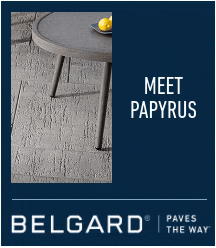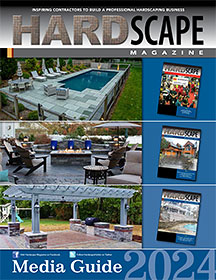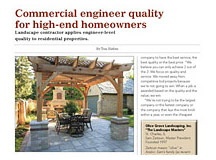Editorials

Marcus vandeVliet
Quick to hire; quick to fire
By Marcus vandeVlietI seldom see an organization of any size that is strong across the board in the 3 key segments of a company: sales, production and administration. The strength of a company tends to reflect the owner’s strength. If you’re strong in sales, then that tends to be the strongest part of the organization. If you are more focused on production, then that tends to be stronger.
Companies have difficulty becoming better in areas outside the owner’s expertise. This starts with how we hire. We tend to hire people we like, people like us – when we should be hiring people that have strengths in the areas where we’re weaker. This requires taking time to honestly assess yourself and your weaknesses.
We also tend to focus too much on a job candidate’s industry experience. We would much rather hire a salesperson, for example, that has 30 years in the landscape/hardscape industry, as opposed to a salesperson who is really good but who only has 3 or 4 years in the industry.
Just because someone has been a salesperson for 30-years doesn’t mean they’re good at what they do. It doesn’t mean they don’t a lot of bad habits. And it doesn’t mean they will fit into your organization and how you do things.
I’d rather promote a less experienced employee already on staff who has the right talents and fits into the company, but who doesn’t have the full set of skills needed. Make sure the employee wants the promotion and is willing to put in the effort to learn. Develop a list of deficiencies and a training program. This process may take 2 to 3 years to develop a key employee, such as a foreman.
If you can’t wait that long and need an experienced employee now, focus on how well job candidates will fit into your existing company, its culture and the other employees. These things are critical in determining a new employee’s success within the company, and how long they will stay.
The biggest problem in hiring is that we don’t hire objectively. We don’t write detailed job descriptions that include measurable expectations and goals, and then hire based on those criteria. We don’t do the research necessary to fully understand the type of person we need to hire for the position.
It’s fairly easy to establish a potential employee's skill level by asking questions and by verifying their past work experience. But it can be very difficult to determine other important qualities such as work ethic, willingness to change, willingness to learn, dependability, resilience and problem-solving.
Some potential employees interview well but are not a good cultural fit. Other employees who don’t interview well may be a perfect fit for your company's culture. The only way to definitely know if the employee is going to work out is to hire them and have them actually work for your company.
I don’t believe you should be slow to hire. My philosophy has always been, "You should be very quick to hire, but even quicker to fire." Set up a short probationary period, give them a chance, but if it doesn’t work out, you need to let them go.
Marcus vandeVliet is the owner of MV Enterprises, a consulting firm dedicated to helping companies take control of their business success. He is also a former Vander Kooi Associate and a former contractor with 25 years in the industry. Call (302) 345-8348 or email marcus@mventerprises.biz.















